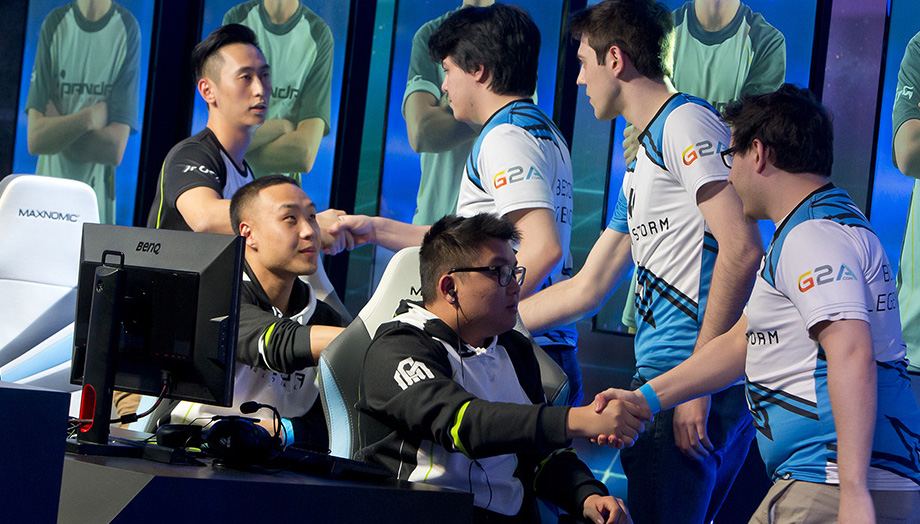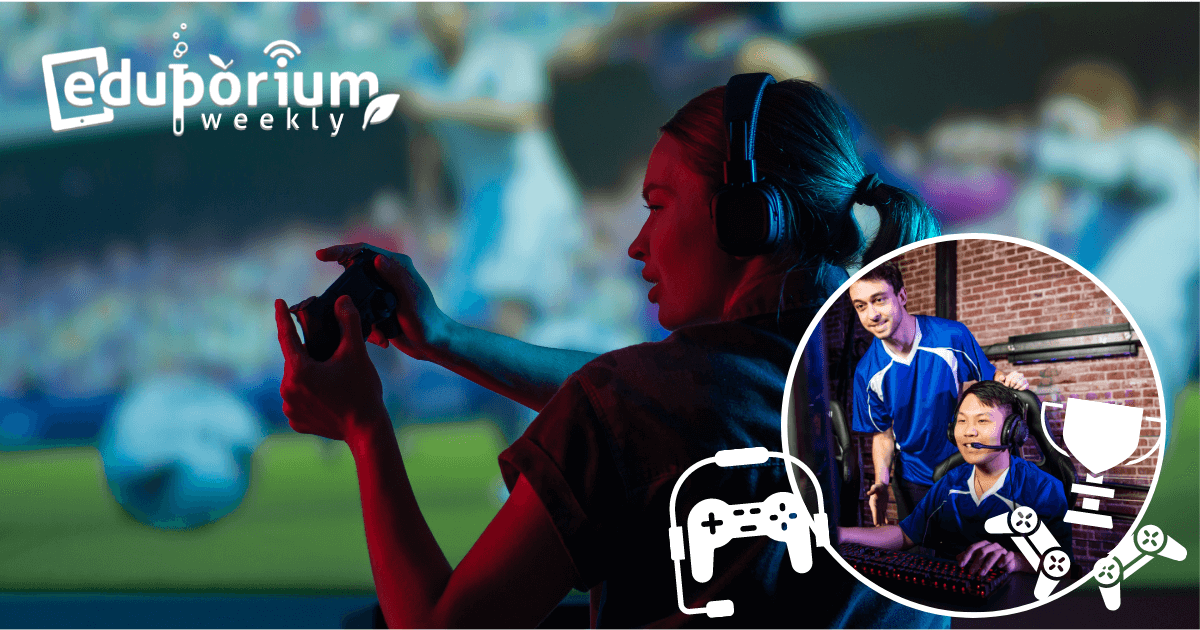Esports has boomed into a huge phenomenon, especially for high school and college students and young adults. It didn't take too long for people, including educators, to realize that esports opportunities in high school could help students develop key real-world skills, feel more included in the school community, and even bolster their chances of receiving an impactful higher education. With that, some school leaders have also explored an esports curriculum to infuse these opportunities into the classroom. While that is possible, we definitely see esports as more of an afterschool activity. If you do want to try creating a dedicated class, however, you can tie esports to both STEM education and 21st century skills development. So, let's take a look at what you might do.
Adding Enjoyment and Learning Experiences through Esports
In creating esports opportunities for students, especially at the high school level, the top priority should be helping with development. This development may happen in various areas, including with social-emotional, academic, career skills, and technical knowhow, and each one creates value for students in different ways. Essentially, if you are adding an esports class to your curriculum, there are probably also multiple potential benefits. Besides actually getting to participate in something they're passionate about, students can learn things like why esports has become so popular and some of the potential benefits and drawbacks to this industry and hobby. Some of the cons of esports in schools are probably fairly obvious but connecting these concerns to their own experiences can help students learn a lot.
Esports in the curriculum or after school.
Some educators see esports as an opportunity to create well-rounded STEM opportunities for students. There's so much they could learn along the way, including how to avoid too much screen time or addiction, how to collaborate with teammates, how to tie these experiences to career options, and more. To be blunt, some benefits of esports, especially for students, aren't necessarily academic. Unless their school leaders create dedicated classes or curriculum, most experiences happen after school or as part of interscholastic athletics. Like more traditional extracurricular activities, these are still valuable experiences for students but not necessarily academic. Most often, this is how school esports programs begin and then administrators may be willing to commit to a class or two after seeing some of the benefits.
The STEM education connection.
You might not realize it but there are actually a lot of connections between esports and STEM learning. It's not even solely due to the fact that these students are using and perfecting new technology skills. Many of the benefits come in the form of soft skills development. Like in STEAM professions, esports athletes must be willing to collaborate and communicate in order to problem solve and succeed. This should also lead to students using a scientific or analytical approach to calculate optimal strategies. Referring to evidence and data, students can connect their esports experiences to STEM preparation. And, this can also help you, as an educator, to start seeing some benefits of a school esports curriculum, too. Plus, it often helps promote and create greater equity and inclusion among all students.
Benefits of STEM and Esports in Curriculum
Since we have a clearer idea of the relationship between STEM and esports, let's explore some curriculum-related applications. At the very core of esports in schools lies a huge connection to science, technology, engineering, and math. Without these key disciplines, nobody would even be able to create video games. And, nobody would be able to make them incredibly immersive, relatable, and fun, so we wouldn't even be talking about how to make them educational, which, incidentally, there's a case to be made for that as well. Anyway, thanks to STEAM, students and gamers can experience unique challenges that help prepare them for the real world—directly and indirectly. Whether it's monitoring statistics, developing strategies, creating a collaborative plan, or analyzing data, real-world skills development fits in a potential esports curriculum.
A purposeful approach to esports in schools.
As we have said, an esports curriculum—even a bare bones one—could help excite students and promote STEM development. In fact, esports athletes often join school programs to gain new knowledge and apply new skills—whether that's with an eye on the future or not. For others, it's about having the opportunity to immerse themselves in a rapidly growing, worldwide community. And, for these students, they'll learn a lot about that community as they experience it for themselves. Among other insights, with coaching, students can see how applying scientific thinking helps enhance their problem solving. With curriculum dedicated to these opportunities, they'll also learn time management skills, how to foster meaningful relationships, and how to stay focused under pressure—key elements of both the STEM world and esports.
Inspiring students and helping them see their value.
As you can tell, the greatest connection to STEM is illustrating how to solve problems scientifically. More of a long-term effect, this helps kids apply the same types of thinking in other areas of their lives, including, of course, in their classrooms. Many of these students will feel positive influences from esports experiences and, eventually, might pursue a STEAM degree or career down the road. Learning about these connections helps students view esports and gaming as more of an opportunity than a distraction. And, it helps identify potential higher education or certificate programs they might want to explore. Even if they are not gaming, all the other opportunities associated with esports can broaden student views of STEM careers. Plus, this helps them see value in their interests and, ultimately, could help increase equity in the workforce.

Connecting Esports to the Existing Curriculum
Not every school with an esports program will also have dedicated esports classes. This might be because administrators are unsure of how to weave it into an already overstuffed curriculum or because it is already benefitting students enough as an extracurricular activity. If you are interested in designing a high school or middle school esports curriculum, connecting it to existing content is key. But, then, there's the question of determining how students can pass this class. Do they pass by winning games? Are they graded based on how well they do against their classmates? Any esports class or curriculum educators implement would be part of a very small group at this point. So, unfortunately, we will likely need to learn more to answer those questions over time—perhaps through trial an error.
Esports curriculum considerations.
When you look at student esports participation from a certain angle, it fits very well into the curriculum conversation. This experience could help catalyze academic growth by inspiring students to connect with each other, work towards a common goal, and fine tune their team-oriented skills. Also, if any students are familiar with games already, this helps create a safe space for exploring in the classroom, particularly when it comes to failing forward. If you hope to have actual gameplay in your potential esports curriculum, there are then other things to consider. If you have a school esports club already, you may know to avoid violent games, for example. To advance learning and development, it might also be optimal to incorporate games that require teamwork or communication. Then, students are more free to showcase their knowledge and how they can come together in new and creative ways.
Esports in CTE or the arts.
Another way to connect your esports curriculum to an existing curriculum is in allowing students to build a visual understanding of key concepts. Many popular esports games have vivid graphics and effects, which educators could capitalize on in sparking student creativity. Tying these experiences to an English class, for example, students can write about these experiences, describing them in great detail. They could reflect on and write about emotions and excitement in coming together to succeed or their growth after a failure. Like they would in assigning group projects in other classes, educators can also set student groups and assign them roles. This could help mimic and actual esports environment and allow students to try different roles. They may get to play, coach, lead strategizing sessions, or promote an event throughout the school. And, particularly in high school esports, this gives CTE students exposure to potential careers, too.
The STEM and Esports Connection
Not every student is interested in gaming but, among those who are, there's often something they have in common. Those who enjoy playing video games and go on to participate in esports programs might often be those who also have ties to STEM. This may be eye-opening but, when you think about it, it does make perfect sense. Students with a strong interest in STEAM may gravitate towards playing games as a way to apply their creativity and determination to solving problems and completing structured challenges. This is strikingly similar to how esports athletes approach meeting their goals. In college, many esports athletes are STEM majors and, in high school, they often have aptitude in science or math. Plus, some of the top colleges in the country also have some of the top esports programs.
Extending the STEM curriculum to esports.
Those who succeed at esports competitions experience a strong overlap with the STEM fields. Navigating a match or a tournament requires gamers to have patience, exercise analytical thinking, and work together. Of course, we can teach this approach to students using experiences within their traditional curriculum but adding esports also helps them connect their own interests in many cases. As more and more high school and college esports programs pop up, the majority of participants continue to have connections to STEAM. It's more clear that this may not just be a trend, so there's more research to do on possible reasons. One is that STEM majors connect with gaming due to similarities to solving science problems or math equations.
How esports promotes inclusivity.
Competing in esports also involves clearly identifying goals and working toward achieve them. Plus, as in STEM, there's a huge push to make sure the esports community is diverse and everyone feels welcomed. And, unlike in traditional sports, there are fewer limitations on things like physical disabilities that affect a gamer's opportunity to participate. It's this sense of inclusion and belonging that's really helped drive the growth of esports at the collegiate and high school levels and another potential element educators should cover in the esports curriculum. And, in terms of expanding equity, this helps level the playing field among students and gives everyone a better chance at competing in college, earning an esports scholarship, or pursuing an esports career. So, yes, the connection between esports and STEM is pretty significant.

Creating Opportunities with an Esports Curriculum
These days, like many others, we're extra focused on equitable learning experiences for children. Unlike in previous years, however, equity isn't only centered on academics and access to cutting-edge instructional technology in the classroom. The reach of equity in education has multiplied and includes greater access to social-emotional opportunities and extracurricular opportunities among others. And, as we know, one reason kids don't join extracurricular activities or clubs is feeling like they don't belong. By drawing on one very popular interest today's students have (gaming), educators can greatly increase equity throughout school buildings and even drive improved academic achievement if they're able to launch a new or largely updated curriculum. And, exploring esports may be one potential option for engaging students.
The social side of esports.
One of the most logical reasons for supporting esports in schools is that it helps enable success for more students. Simply being involved in an afterschool activity can help student social confidence and academic success skyrocket. Besides that, some other key values they'll learn are the importance of being social and how to foster relationships. Gaming is often thought of as a solo activity that's usually done in isolation. On the contrary, however, esports participation in school environments demands communication, persistance, and team values—as we've said. These pro-social values help students feel more comfortable around the school building and can help transform how they interact with peers moving forward—both those who are on their team and those who are not.
Shaping a future with esports.
Students don't need to attend an esports academy in order to benefit from gaming with peers. They also don't really need to have the highest skill in order to benefit from these experiences. If they can refine their soft skills as well as key STEM skills, that's definitely the start of a win. These experiences alone can help students better position themselves for either attending college or starting a career in almost any industry. In either case, having participated in esports competitions should serve them well. If they don't develop a passion for working with others, they will probably develop a passion for STEM-based problem solving. And, we're certainly not saying they can't do both. Plus, if they are committed enough to esports and their STEM interest continues, it's good to know that many top college esports programs are at universities with strong STEM programs as well.
If you are interested in learning about how to create an esports team or discussing some of the positive effects of esports in greater detail, we'd encourage you to reach out to us. Be sure to explore the Esports section of our store (above) to find our offerings or create an esports quote. For the latest EdTech, STEAM, and 21st century education news, follow Eduporium on Twitter and Instagram. Like us on Facebook, too, or sign up for our newsletter for our latest product announcements and offerings. If you have an idea for an Eduporium Weekly theme, send us a message on social media or comment below.







